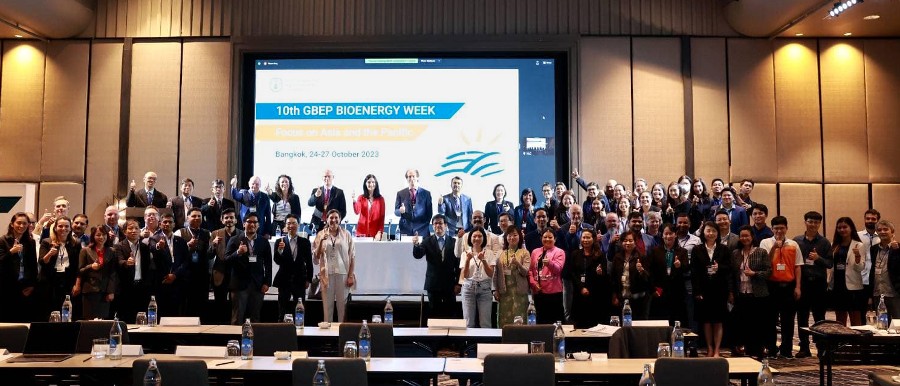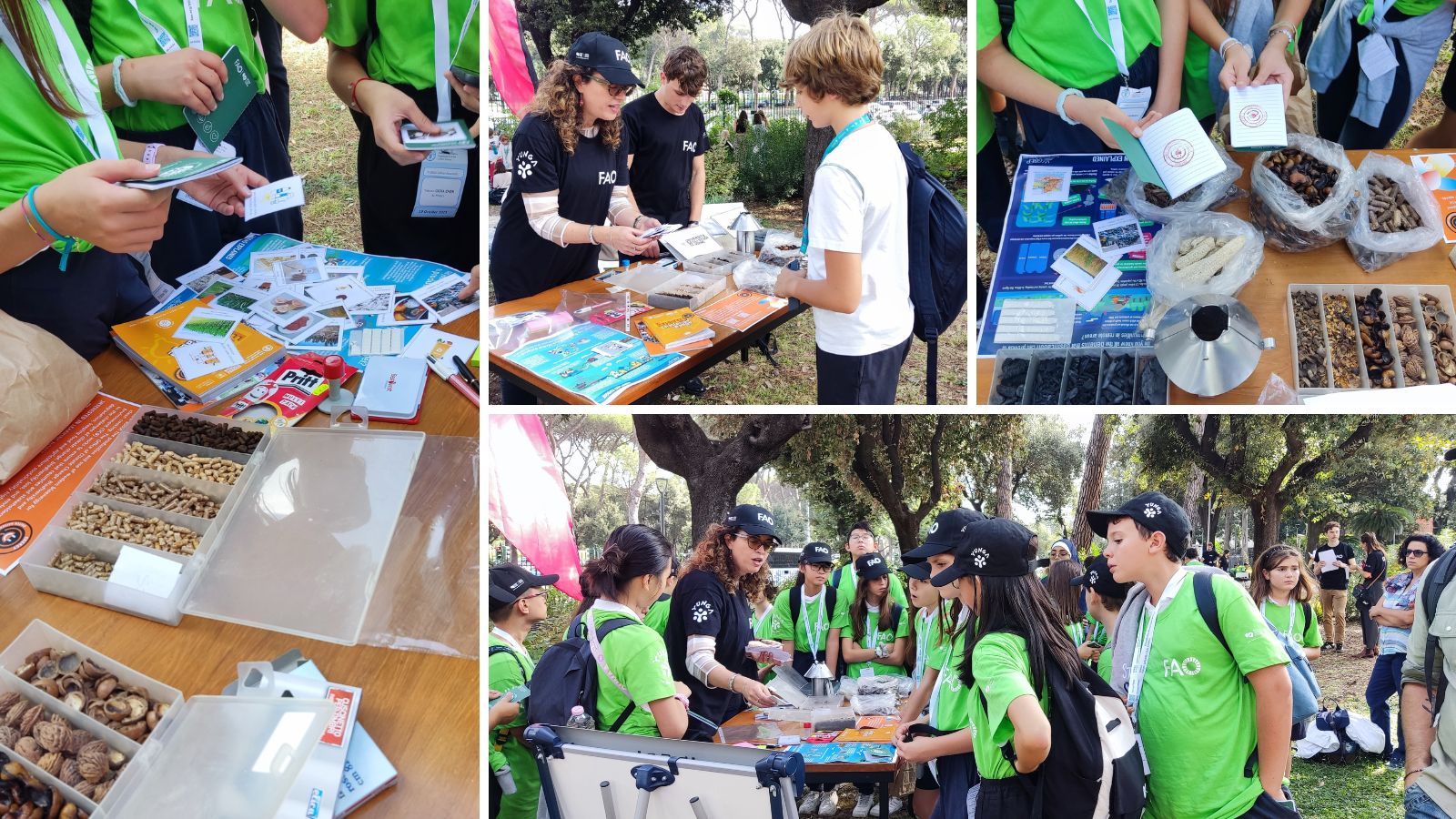GBEP Newsletter #30
A yearly wrap-up of GBEP's work in 2023 and looking forward to 2024.

The importance of bioenergy for reaching climate targets has never been more evident. Both IRENA and IEA predict that a large share of bioenergy will be required in the global energy mix. IRENA forecasts 16% of global energy demand to be covered by sustainable bioenergy in their 1.5°C-aligned scenario for 2050, from around 5% today. For IEA, modern bioenergy is also a significant pillar in their net zero scenario, as it will continue to account for almost half of all renewable energy supply, whilst doubling the overall share from 6% in 2022 to 13% in 2030.
GBEP is working to ensure that modern, sustainable bioenergy reaches its potential to contribute to climate mitigation targets and the inclusive energy transition. To this end, the focus of the Partnership this year has been on capacity building efforts, supporting stakeholders at all levels to understand the risks and opportunities of bioenergy, and supporting a science-based approach to its sustainable development at the local level.
2023 was an important year for GBEP, as it was the first time that Partners and Observers met in person for the governance meetings since the COVID-19 pandemic. It was a chance to celebrate the achievements of the last 17 years of the Partnership, and its growing membership, as the total number of members reached 90 this year with the engagement of Nigeria, UN-ESCAP, UNSD, World Bioenergy Association and World Biogas Association as Observers. GBEP also welcomed Argentina and Italy as the new co-chairs for the 2023-24 biennium, taking over the important role of leading the Partnership from Brazil and the United States.
This year was also the year that the communications approach of GBEP was re-invigorated in order to enhance GBEP’s visibility and outreach, with fresh harmonized branding of all communications, a new, more user-friendly GBEP website, and a greater social media presence.
GBEP Bioenergy Weeks
The 10th Bioenergy Week, the GBEP flagship event, was held this year in Thailand from 24 to 27 October and focused on Asia and the Pacific, where bioenergy is a key component for meeting soaring energy demand while achieving net-zero targets. The event was organized by the FAO in the context of GBEP, hosted by the Department of Alternative Energy Development and Efficiency (DEDE), Ministry of Energy, Thailand, with the contribution of the United Nations Industrial Development Organization (UNIDO) and the financial support of the Italian Ministry of Environment and Energy Security, U.S. Grains Council and World Bioenergy Association. Around 120 participants from more than 30 countries and international organizations engaged in expert presentations, panel discussions and networking moments.
The event was the opportunity to discuss all forms of bioenergy – solid, liquid and gaseous biofuels – as well as delve into specific topics, such as ethanol for clean cooking. This latter thematic area is the focus of a new FAO/GBEP project financed by USDA-FAS on facilitating and enhancing the dialogues across sectors for the adoption of sustainable bioenergy, with a primary focus on ethanol for clean cooking in African and Asian markets. The session at the 10th GBEP Bioenergy Week was the first activity of the project, and brought together stakeholders to discuss benefits of ethanol’s use as a fuel and the steps needed for its uptake for clean cooking. The informal group within GBEP on linkages between bioenergy, food security and nutrition, is further amplifying the importance of the topic and expanding the activities of this project with related articles and initiatives. The group will also be considering the bioenergy-nutrition nexus more broadly, by investigating good practices across bioenergy value chains that could positively impact nutrition security.

Participants at the 10th GBEP Bioenergy Week pose for a photo in Bangkok, Thailand.
Preparations are already underway for the 11th Bioenergy Week, which for the first time, will take a global perspective on bioenergy, bringing together stakeholders from all over the world to share knowledge and experience. The 11th GBEP Bioenergy Week was recently announced at COP28 by the Italian Minister of Environment and Energy Security, Mr. Gilberto Pichetto, and will be hosted by the government of Italy. The conference will include 3 days of seminars and a field visit. In parallel with the 11th GBEP Bioenergy Week, a half-day meeting of UN-Energy will also take place at FAO headquarters.
The conference will also include an entire day dedicated to youth, as part of the ongoing commitment of GBEP to involve and empower youth in bioenergy topics. The new GBEP Bioenergy Youth Day 2024 will be organized in cooperation with the Youth and United Nations Global Alliance (YUNGA) and will encompass both educative and training activities on sustainable bioenergy, with a focus on innovations and technologies. The activities will be targeted to students of various age groups, with a Bioenergy Discovery Circuit for high school students aged 11-15 and Bioenergy lectures given by global academic experts for master’s and PhD students. The GBEP Bioenergy Youth Day 2024 will also be the opportunity to present the 2024 GBEP Youth Award.
Empowering youth for a just energy transition
The newly announced GBEP Bioenergy Youth Day is just one of the GBEP activities to empower youth involvement in the bioenergy sector and foster a just energy transition.
Since 2021, the annual Bioenergy Week has been an opportunity to announce the winner of the GBEP Youth Award and allow the winning student to present their research to a unique platform of key bioenergy stakeholders and experts. The winner in 2023 was PhD candidate Mr. Rakesh Godara from the Sardar Swaran Singh National Institute of Bio-energy (SSS-NIBE), Punjab, India, who had the opportunity to present his work not only in person at the Bioenergy Week but also as part of a side event at the Italian Pavilion at COP28. The initiative will continue in 2024, and the call for applications for the 2024 GBEP Youth Award will open in January 2024 with a global focus to reflect the scope of the 11th GBEP Bioenergy Week.
As well as youth activities related to the Bioenergy Weeks, GBEP has also carried out many other youth events and activities in 2023. On 19 October 2023, the Secretariat contributed to the YUNGA School Assembly held in the context of the World Food Forum 2023, with a ‘Discovery Station’ on sustainable bioenergy, which included demonstrations of practices and innovative technologies for sustainable bioenergy. It was an exciting opportunity for 600 high school students to see first hand how bioenergy can work in practice.

School children attend the GBEP 'Discover Station' on sustainable bioenergy at the World Food Forum 2023.
GBEP also provides more technical capacity building by presenting seminars to university students. Most recently, GBEP contributed to the agronomy course at the University of Florence with a seminar titled “Bioenergy for sustainable and climate-smart agrifood systems”.
Building capacities and joining forces
The GBEP 2023 capacity building webinar series covered many diverse topics, including wood energy, co-benefits of biogas and biomass production practices for improving biofuel sustainability. The recordings of all the GBEP webinars have now been made available in a dedicated playlist on the FAO Youtube Channel, which boasts an impressive 184 000 subscribers.
As well as carrying out its own activities, GBEP also supporting the undertakings of other organisations. One such initiative was the LEDSLAC Bioenergy Community of Practice’s Bioenergy Challenge 2023 (Desafío de Bioenergía Latinoamérica y el Caribe 2023), where GBEP supported with guidance and capacity building activities on sustainability.
The GBEP Secretariat also brought the experiences of the Partnership to various events, including the European Biomass Conference and Exhibition 2023, IEA Bioenergy Executive Committee Workshops, Global Ethanol Summit, CEM Biofuture Platform workshops and the IRENA-ENI Capacity building training programme on biofuels.

Constance Miller, Deputy Coordinator of GBEP, discusses biofuel sustainability at the Global Ethanol Summit 2023 alongside fellow panelists from the World Bank, IICA and OECD. Credit: U.S. Grains Council
As well as ad hoc collaboration, GBEP is also shepherding a new cross-initiative coordination group on bioenergy, which aims to amplify the activities of international organisations working on bioenergy by aligning and complementing their efforts. The group is already meeting regularly and the priority for 2024 will be a joint statement on bioenergy for sustainable development.
Assessing the sustainability of low-iLUC biofuels – The ‘BIKE’ Project
As an important framework for assessing the sustainability of bioenergy, the GBEP Sustainability Indicators have been used in a number of contexts and regions as a basis for the development of assessment and monitoring frameworks. Most recently, the GBEP Indicators provided the basis for the indicators used in the sustainability assessment of the ‘Biofuels production at low-ILUC risk for European sustainable bioeconomy – BIKE’ project.
The BIKE project was a three-year Horizon 2020 project that concluded in August 2023 with the aim to support the implementation of the RED II of the EC by providing evidence, measuring and widely disseminating the market potential of low-ILUC risk value chains for biomass, biofuels and bioliquids in Europe. FAO, as a consortium member, developed the sustainability assessment framework for the project and applied it to four case studies. The interesting results of these assessments can be found on the BIKE website.
GBEP in 2024
In 2024, as well as the flagship Bioenergy Week conference, GBEP has many other important workstreams under which it will be conducting technical activities and events.
Capacity building webinars will continue under the main thematic areas of biogas and advanced liquid biofuels. Canada and FAO, as the co-leaders of the activity group on wood energy, will be spearheading the work of GBEP on carbon accounting for wood energy in 2024, with various online capacity building workshops on data and methodologies. Specialised technical meetings and workshops will also take place on the sustainability of bioenergy within the broader bioeconomy.
Another focus for the partnership in 2024 will be on clean cooking and its contribution to food and nutrition security. Under a new project financed by USDA-FAS, in 2024, GBEP will organize two national dialogues, one in Rwanda and one in Uganda, with the aim to facilitate cross-sectoral dialogues on sustainable bioenergy for clean cooking, with a focus on bioethanol fuel and related technologies. The project seeks to increase understanding, awareness, and adoption of ethanol for clean cooking to replace traditional cooking fuels (e.g. fuelwood, charcoal, LPG) in the region and to highlight the importance of adopting standards for ensuring the high quality and safety of both ethanol fuel and related cookstoves.
GBEP will also be continuing its new approach to communications and outreach, with the new GBEP website now up and running, as well as a greater social media presence on LinkedIn.
